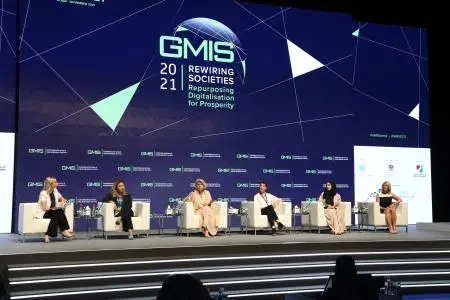PHOTO
Dubai, United Arab Emirates : Zimbabwe’s Minister of Industry and Commerce, H.E. Hon. Dr. Sekai Nzenza, today credited access to education for shaping her leadership capabilities, and urged others to look beyond the headline “statistics that often blur, or do not reflect the true reality of African women, leaving out their knowledge, wisdom, and entrepreneurial spirit.”
Nzenza was speaking during a panel session on day two of the fourth edition of the Global Manufacturing and Industrialisation Summit (#GMIS2021) today, which saw celebrated women leaders in business and multilateral organisations emphasise the importance of science, technology, engineering, and mathematics (STEM) education in levelling the playing field for gender equality in a future workforce.
Emphasising the positive impact of technology on increasing women’s inclusion in male-dominated sectors, such as oil and gas, Fatema Al Nuaimi, CEO of Abu Dhabi National Oil Company Liquified Natural Gas (ADNOC LNG), said: “Technology is going to play a key role in enabling the integration of more and more women into the LNG sector, which has traditionally had challenging workplace conditions for women to operate in, as we explore remote field operations and integrating AI for automation.”
These industry transformations will require “talent regardless of its background,” she added.
Speaking on emancipating the job market, Chiara Corazza, Special Representative to the G7 and G20 at the Women’s Forum for the Economy & Society, said: “85% of jobs in 2030 do not exist yet, but STEM education will offer the same opportunities for our young boys and girls, because talent has no gender.”
“There is a leaky pipeline for women talent in STEM,” said Ayumi Moore Aoki, Founder and CEO of the global NGO Women in Tech, referring to the lack of women who receive STEM education without entering the STEM workforce, and the subsequent loss of interest in STEM subjects among teenage girls.
She added that women need to be encouraged into leadership from a young age, “from classroom to boardroom, we need to teach women to become leaders.”
For her part, Tiffany Kelly, Founder and CEO of Beyond Bamboo, an online marketplace and wholesale platform for sustainable and ethical products, said: “We need to look at a culture change, and move away from the parasitic view of leadership and towards inclusive leadership standards that encourages collaboration and partnership.”
Jan Ward, CEO of industrial parts maker Corrotherm, said: “Ultimately, if you don’t have diversity, you don’t get diversity of creativity and understanding.”
Under the theme ‘Rewiring Societies: Repurposing Digitalisation for Prosperity’, #GMIS2021 convened key global leaders from government, business, and civil society to discuss how data and connectivity are shaping the future of the manufacturing sector while presenting opportunities for investments in technology, innovation, and industrialisation.
-Ends-
About GMIS:
The Global Manufacturing and Industrialisation Summit (GMIS) was established in 2015 to build bridges between manufacturers, governments and NGOs, technologists, and investors in harnessing the Fourth Industrial Revolution’s (4IR) transformation of manufacturing to enable the regeneration of the global economy. A joint initiative by the United Arab Emirates and the United Nations Industrial Development Organisation (UNIDO), GMIS is a global platform that presents stakeholders with an opportunity to shape the future of the manufacturing sector and contribute towards global good by advancing some of the United Nations Sustainable Development Goals.
The first two editions of the Global Manufacturing and Industrialisation Summit were held in Abu Dhabi, United Arab Emirates in March 2017, and Yekaterinburg, Russia in July 2019, respectively, with each edition welcoming over 3,000 high-level delegates from over 40 countries. The third edition, GMIS2020, was held virtually in September 2020 and convened over 10,000 attendees and close to 100 thought-provoking leaders from governments, businesses, and civil society.
#GMIS2021, the fourth edition of the Global Manufacturing and Industrialisation Summit, will be held once again in the United Arab Emirates from November 22 to 27, alongside EXPO Dubai, under the theme – Rewiring Societies: Repurposing Digitalisation for Prosperity.
To learn more about GMIS, please visit https://gmisummit.com/ and follow GMIS on Twitter: @GMISummit, Instagram: @gmisummit, LinkedIn: GMIS - Global Manufacturing & Industrialisation Summit, and Facebook: @GMISummit.
Press Contact:
Reethu Thachil
Head of PR and Communications
EYESOME X, Press Office for:
Global Manufacturing & Industrialisation Summit
Mohammed Bin Rashid Initiative for Global Prosperity
+971 58 847 6870/ reethu@eyesomex.com
© Press Release 2021
Disclaimer: The contents of this press release was provided from an external third party provider. This website is not responsible for, and does not control, such external content. This content is provided on an “as is” and “as available” basis and has not been edited in any way. Neither this website nor our affiliates guarantee the accuracy of or endorse the views or opinions expressed in this press release.
The press release is provided for informational purposes only. The content does not provide tax, legal or investment advice or opinion regarding the suitability, value or profitability of any particular security, portfolio or investment strategy. Neither this website nor our affiliates shall be liable for any errors or inaccuracies in the content, or for any actions taken by you in reliance thereon. You expressly agree that your use of the information within this article is at your sole risk.
To the fullest extent permitted by applicable law, this website, its parent company, its subsidiaries, its affiliates and the respective shareholders, directors, officers, employees, agents, advertisers, content providers and licensors will not be liable (jointly or severally) to you for any direct, indirect, consequential, special, incidental, punitive or exemplary damages, including without limitation, lost profits, lost savings and lost revenues, whether in negligence, tort, contract or any other theory of liability, even if the parties have been advised of the possibility or could have foreseen any such damages.




















